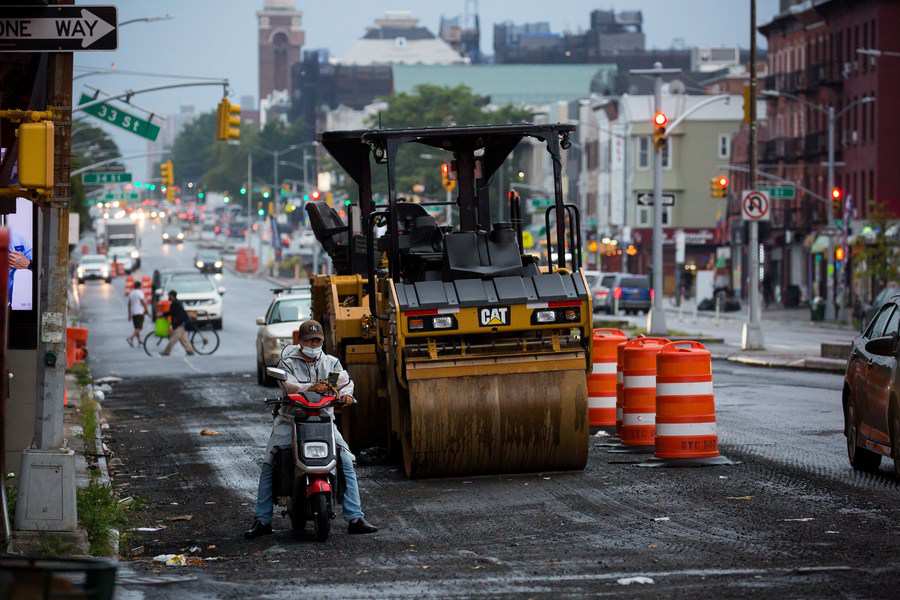U.S. Senate approves 1.2-trln-USD infrastructure bill despite deficit concerns
Video: The U.S. Senate on Aug. 10, 2021 approves a long-awaited 1.2-trillion-dollar infrastructure bill by a final vote of 69-30, after months of strenuous negotiations between Democrats and Republicans. (Xinhua)
Despite wide support from both sides of the aisle, James Pethokoukis, a senior fellow at the American Enterprise Institute, urged policymakers to pay attention to the worthiness of infrastructure projects.
WASHINGTON, Aug. 11 (Xinhua) -- The U.S. Senate on Tuesday approved a long-awaited bipartisan infrastructure bill after months of strenuous negotiations, though analysts are concerned that this legislation falls short of its promise to be fully paid for.
In a rare stroke of bipartisanship, more than a dozen Republicans joined Democrats to back the legislation. The final vote was 69-30, comfortably surpassing the 60-vote threshold required for most legislation in the 100-seat upper chamber.
The infrastructure bill, despite a political victory for President Joe Biden, is much smaller than the size of what he originally proposed. Despite that, budget groups argued the administration would most likely have to borrow heavily to fund the projects, pushing up the already ballooning deficit.

Photo taken on Aug. 10, 2021 shows the U.S. Capitol building in Washington, D.C., the United States. (Xinhua/Liu Jie)
"DECADES OVERDUE" INVESTMENT
According to the American Society of Civil Engineers, the country's infrastructure scores a C minus, with 43 percent of public roadways in poor or mediocre condition, and 7.5 percent of the nation's bridges "structurally deficient."
The group noted that the United States has been "underinvesting" in its infrastructure for decades. In 2019, the country spent just 2.5 percent of its gross domestic product (GDP) on infrastructure, down from 4.2 percent in the 1930s, said the organization, adding that the COVID-19 pandemic has made a difficult situation "worse."
Senate Majority Leader Chuck Schumer said on the Senate floor before the vote that this is a "decades overdue" step to revitalize the country's crumbling infrastructure, calling it the "most robust injection of funds" into infrastructure in decades.
In a speech at the White House, Biden said he is happy to mark this "significant milestone" on the road toward making "long-overdue," "much-needed" investments in basic, hard infrastructure of this nation.
"Clogged arteries at the heart of our economy -- they are going to be opened up," he said.
The president noted that forecasters on Wall Street project that over the next 10 years, such investments will create an additional 2 million jobs a year beyond what was already projected.
In late March, Biden unveiled a roughly 2-trillion-U.S.-dollar infrastructure plan, but it was harshly criticized by Republican lawmakers, who argued it is not targeted on infrastructure and costs too much.
After months of negotiations, a bipartisan group of senators reached an agreement on a 1.2-trillion-dollar infrastructure bill, which includes 550 billion dollars in new spending on infrastructure projects, such as roads, bridges, passenger rails, drinking water and waste water systems. The rest of the package involves previously approved spending.
Despite wide support from both sides of the aisle, James Pethokoukis, a senior fellow at the American Enterprise Institute, urged policymakers to pay attention to the worthiness of infrastructure projects.
"The point here is that there can be diminishing returns from spending," Pethokoukis argued in an earlier article. "And we should not overestimate the impact of infrastructure investment in an advanced, built-out economy like America's."

A person rides a moped past a steamroller on a section of 4th Avenue that is being repaved in the Brooklyn borough of New York, the United States, Aug.10, 2021. (Photo by Michael Nagle/Xinhua)
NOT FULLY PAID FOR
Even though authors claim the bill would be fully paid for, budget watchers, as well as the non-partisan Congressional Budget Office (CBO), believe otherwise, voicing concerns over the country's fiscal situation.
"While we are pleased Republicans and Democrats have come together to move forward important public investments, this legislation falls far short of its promise to be fully paid for," Maya MacGuineas, president of the Committee for a Responsible Federal Budget, a U.S. watchdog group, said in a statement Tuesday.
Citing a recent report from the CBO, the watchdog group noted that the legislation would add 256 billion dollars to the federal deficit over 10 years, and cost nearly 400 billion dollars when including indirect effects from a higher transportation spending baseline.
MacGuineas urged the House of Representatives to improve the legislation by supplementing the current pay-fors with additional revenue, spending reforms, and user fees, for the benefit of the nation's long-term fiscal and economic outlook.
What could also be worrisome for budget watchers is a separate 3.5-trillion-dollar spending plan, through which Democratic leaders have been seeking to enact most of Biden's social-spending agenda without Republican support.
The massive package, which focuses on childcare, education, health care and climate policy, is expected to be approved in the Senate via the budget reconciliation process, which only requires a simple majority to pass a legislation.
According to a recent estimation by the Committee for a Responsible Federal Budget, the two spending plans will, in reality, require nearly 1 trillion dollars of direct borrowing and set the stage for roughly 2.9 trillion dollars of total borrowing over the next decade.
This cost would lift debt to 115 percent of GDP (as opposed to 106 percent) by 2031, the group noted.
"It is commendable that policymakers have called for fully offsetting new spending and tax breaks," the group said. "But rather than rely on gimmicks and sleights of hand to achieve this, they should either scale back the proposals, identify the necessary tax increases and spending reductions to cover the full costs of their proposals, or both."

Trains are parked at the Metropolitan Transit Authority (MTA) 38th St Train Yard &Facility in the Brooklyn borough of New York, the United States, Aug. 10, 2021. (Photo by Michael Nagle/Xinhua)
ARDUOUS PATH AHEAD
Looking ahead, the infrastructure bill -- even with its bipartisan nature -- could face an arduous path in the House.
Some Democrats want a bigger package with different focuses. The House previously passed its own transportation and drinking water infrastructure bill, which includes more money for efforts to fight climate change.
House Speaker Nancy Pelosi, the top Democrat in the lower chamber, recently said that the bipartisan infrastructure plan will not get a vote until until the Senate approves the larger, Democratic-only 3.5-trillion-dollar spending package, prompting criticism from Republicans.
White House Press Secretary Jen Psaki said at a briefing Tuesday that the administration is confident and comfortable with the strategic approach of Speaker Pelosi, and the president "looks forward to signing each of these pieces of legislation into law."
Schumer, the top Democrat in the chamber, said the infrastructure bill -- despite its significance -- does not address other challenges the country is facing, noting that Democrats believe "we need to do much more."
The Democratic budget will lower costs for Americans, cut taxes for American families, create millions of jobs while tackling the climate crisis, and "it is paid for by the wealthy and corporations paying their fair share," said Schumer.
Republicans, however, repeatedly lashed out at the massive spending plan, calling it the "socialist fantasy" for the far left, and warning that the tax hike would hurt U.S. businesses and families, and the high price tag would exacerbate inflation and push up the already ballooning debt.
With the Senate split 50-50, Democrats must keep moderates -- who could oppose elements of the agenda -- on their side, allowing Vice President Kamala Harris to cast the deciding vote.
Some moderate Democrats, including Senator Kyrsten Sinema of Arizona, have raised concerns about the potential cost of the package and the tax hikes proposed to pay for it. She said last month that she would oppose a bill that costs 3.5 trillion dollars, drawing backlash from her Democratic colleagues.
In a letter Monday, Schumer told Democrats that the goal is for Congressional committees to write legislation by Sept. 15, before the House returns from its August recess. The specifics of the tax increases could be one of the major sticking points as Democrats craft the bill in the coming weeks.
Photos
Related Stories
- Taliban seizes key Afghan cities, Washington stuck in limbo amid troop withdrawal
- Vaccine mandates become "sticky issue" as COVID-19 cases top 36 mln in U.S.
- U.S. scapegoats China for domestic pandemic response failure: Russian scholar
- 2 killed, at least 3 injured in U.S. Portland shooting
- U.S. struggles to find enough firefighters as wildfires rage across West: media
Copyright © 2021 People's Daily Online. All Rights Reserved.










